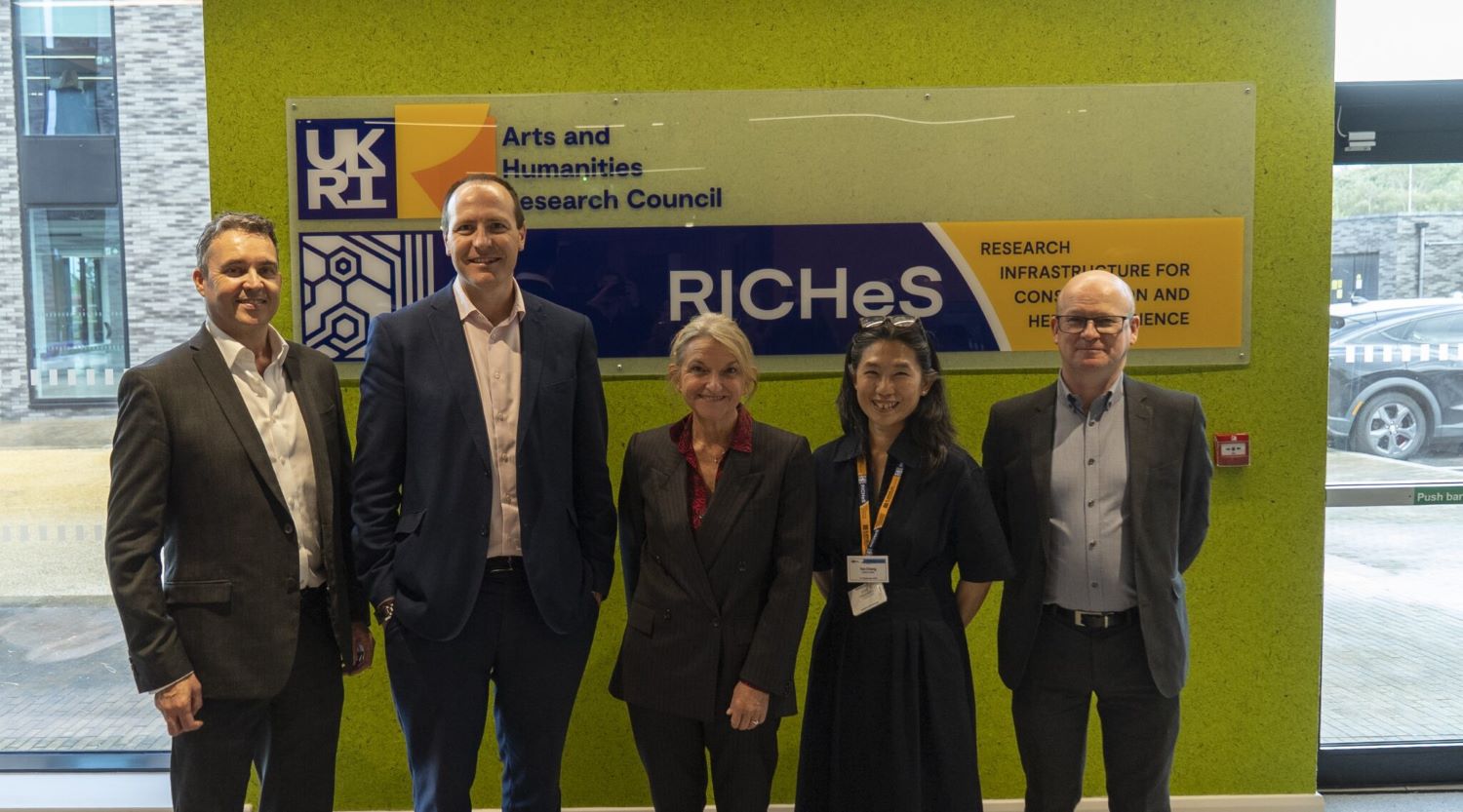On Thursday 11 September 2025, UK Research and Innovation (UKRI) Chief Executive Officer, Professor Sir Ian Chapman opened the new sustainable Infrastructure Headquarters (IHQ) for the Research Infrastructure for Conservation and Heritage Science (RICHeS) programme at the leading science and innovation campus, Sci-Tech Daresbury.
The facility, described as a model for future research workplaces, is designed to minimise environmental impact while maximising collaboration, innovation and wellbeing.

The opening represents a milestone in the £80 million RICHeS programme, led by the UKRI Arts and Humanities Research Council (AHRC), which is transforming the UK’s capacity for conservation and heritage science, equipping researchers and practitioners with equitable access to cutting-edge facilities, innovative collection and specialist expertise.
Prioritising Sustainability in Research Infrastructure
The new RICHeS IHQ has been developed with a strong emphasis on sustainability. Designed around low-carbon principles, the facility incorporates recycled and reclaimed materials throughout its interior, alongside high-efficiency energy systems that power its day-to-day operations.
Professor Iain Chapman, UKRI CEO commented:
The opening of RICHeS IHQ demonstrates UKRI’s commitment to investing in sustainable heritage infrastructure that supports research excellence across the UK. It will build long-lasting impact through regional job creation, upskilling and by leveraging additional funding.
RICHeS is creating an extraordinary opportunity for collaboration between scientists, heritage experts and cultural organisations, ensuring the UK leads globally in conservation and heritage science.
National Hub for Heritage Science
From this low-carbon base, RICHeS will coordinate a UK-wide distributed network of research facilities, collections, and specialist expertise, ensuring researchers across the four nations have equitable access to cutting-edge tools and knowledge.
Backed by an initial £37 million in funding, RICHeS is currently supporting 31 projects across the UK. These include 13 host collections, 17 host facilities, and one national digital research service, the Heritage Science Data Service (HSDS).
The programme is already demonstrating measurable impact:
- 58 new jobs created
- 266 staff trained and/or upskilled, building national sector capacity
- £1.9 million in leveraged funding generated
- 1,158 individuals engaged through site visits, workshops and events
Professor Meggen Gondek, Head of RICHeS IHQ, emphasised the broader ambition of the programme, noting:
From here, we are coordinating world-class facilities, digital platforms and collaborative networks that are transforming how we care for and understand our heritage.
During the event, Sir Iain Chapman toured RICHeS IHQ, meeting with researchers supported by RICHeS’ first tranche of funding. Demonstrations included portable technologies for in-situ heritage conservation, digital innovation in heritage science, and prototypes highlighting how advanced materials research is supporting sustainable conservation.
A Global Connector with a Sustainable Heart
Since March 2025, RICHeS IHQ has served as the UK National Node for the European Research Infrastructure for Heritage Science (E-RIHS ERIC). This connects UK researchers and heritage professionals to advanced facilities, expertise, and transnational training across Europe while integrating UK resources into the E-RIHS global catalogue.
Professor Christopher Smith, Executive Chair of AHRC commented:
RICHeS is a major investment by UKRI and AHRC in the concept that care for our past offers a path to sustainable growth for our future.
The programme brings together past, present, and future by applying advanced technologies to cultural preservation in environmentally responsible ways. This approach reflects AHRC’s broader commitment to growth that supports both people and the planet.
Driving Innovation and Growth
Sci-Tech Daresbury is also home to the Science and Technology Facilities Council’s (STFC) Daresbury Laboratory, which is also part of UKRI and known for its world class skills and research infrastructure. This ranges from particle accelerator research to advanced digital technologies and artificial intelligence, to cutting edge microscopy facilities.
John Leake, Business Growth Director, Sci-Tech Daresbury commented:
By embedding RICHeS within our community of scientists, entrepreneurs and global companies, we are not only supporting the future of heritage science but also strengthening the UK’s position as a leader in sustainable, knowledge-driven growth.
